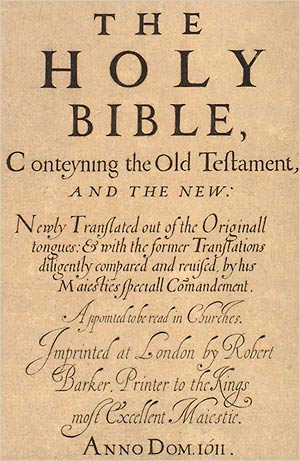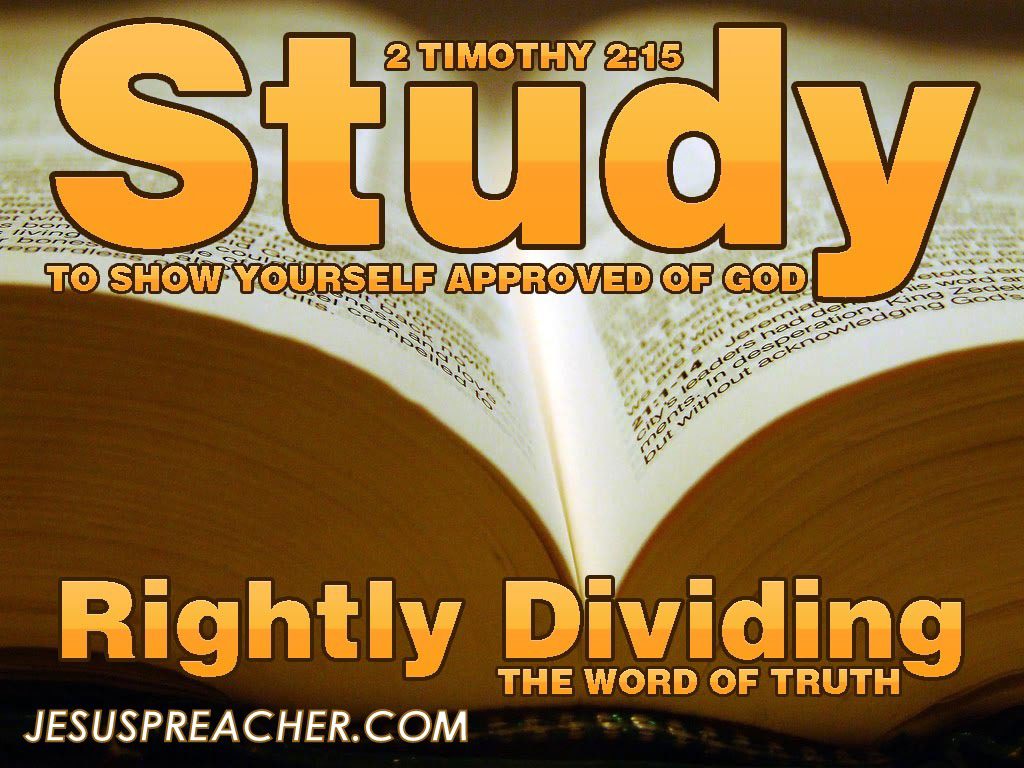
by John McGlone 08/17/2017
John 3:16¶ For God so loued þe world, that he gaue his only begotten Sonne: that whosoeuer beleeueth in him, should not perish, but haue euerlasting life.
English spelling differences in John 3:16 U = V (Example: loued = loved; gaue = gave) y with ‘e’ above it was used as represent the ‘thorn’ character, which means ‘the’) [learn more] nn (Sonne = Son) Other spelling differences V = U (Example: vnto = unto | See John 1:11. As a variation of the same letter, ‘V’ was used at the beginning of a word and ‘U’ within. ) VV = W (Example: svvord = sword) [The V was called a ‘U’, this is why we still call a W a ‘double U’] I = J (Example: Iesus = Jesus | See John 1:17) Long “s” letters look similar to “f” letters (Notice the ‘Old Testament’ type example on the right) KJVOnlyists make the claim this is only a font issue and nothing else.
I really liked Pastor Britt Williams defense of the KJV only years ago when I was actively preaching and teaching from the NKJV. He is the senior Pastor of Consuming Fire Fellowship. It was challenging, yet there are some straws that must be dealt with to answer with assurance. Here is a link to that four part series on his FB.
Pr. Britt Williams Defense of KJVO part 1
FB Discussion with brothers from Consuming Fire Fellowship on KJVO.
This occurred after I had become a KJVP using primarily the NKJV for preaching and study.
If you liked that video, check this one with 22 errors in the KJV. I’m sure the KJVO will decry that I am a Bible corrector. Here is the work of a Bible ‘corrector’ that found twenty two problems. 22 Errors
Why PSALM 12:6-7 Is Not a Promise to Preserve Innerrant Scripture.
When I became a believer August 3rd, 1996, I did so by confession at the prompting of the Holy Ghost. I didn’t have a Bible, a church, or even a witness at the baptism of new birth, save the Comforter whom had been convicting me for about 9 months. When I got to a local church a week later, they gave me a NIV Bible. I won’t even start to defend all the problems I have found therein over the course of 21 years. But, by faith I used this translation for about five years. I was then introduced to the idea by a faithful brother that the NASB was a better translation. He gave me a copy and I picked up the mantle of that translation that many reformed brothers will prefer. A few years later, our Pastor had changed to the NKJV, and I liked the ease of reading and being able to follow along exactly with what the Pastor was teaching. Then about 13 years ago, I came to holiness and the Lord led me to immediately pick up the KJV translation. I then faithfully used that translation; teaching my family, for our children a first reading primer, and open air preaching for about five years. We by faith moved to NC to join a family in ministry and very shortly after we started out fellowship together, Kerrigan introduced me to the idea that the KJV and NKJV were from the same family of manuscripts. He also pointed out for the open air work that we would do together, that the lost soul would better understand from a more modern English translation. We were yoked together preaching the NKJV for about seven years. Unfortunately, our ministry together had a falling out which was partly due to the differences between the NKJV he had convinced me to use, and what I found in the KJV which contradicted his beliefs about how Matt 18 should be handled, and other issues. Here is a link to that problem which I believed the KJV was far superior in translation in these key verses regarding the dispute.
NKJV vs. KJV Confusion
However, there are problems on the other side of the coin which the KJVOnlyists will not deal intelligently with. I don’t mean I have a problem with the translation, but the idea that the KJV is the ONLY inspired Word of God in the English language.
Some of the Many Major Points of Controversy for the KJV
- First, Dramatic Text Difference Problem.
- Second,The KJV 1611 Preface by Translators to the Reader Problems
- Third, the end of Revelation Conundrum.
- Fourth, the not Inspired, but Preserved Dilemma.
- Fifth, the Historic English Bible Record Ante-1611
Firstly, The Dramatic Text Difference Problem
The 1611 Authorized KJV Bible translation is nothing like what we have in our hands today. This begs the question if it is the inspired Word of God in the Englifh, it should never have been changed at all. Here is a link to look at a copy of the original language of that Bible from the OSU server: Authorized KJV 1611 original manuscript
Can you see how difficult this is to read in the modern English language? Is this the inspired Word that you study daily and bring to church with you? My KJVO friends will say, “This is a non issue as it is just changes in fonts.” But, is that true? The letter ‘J’ didn’t even exist in it’s use at that time so Jesus’ name was spelled Iesus. So, this wasn’t a font issue but a letter non existence issue. Then, my point would be that for the KJVO position to be true you would have to read and be able to understand and communicate this language that is almost unrecognizable only a bit over 400 years later.
Original King James Version English
Secondly, The KJV 1611 Preface by Translators to the Reader Problems
In the preface of the original KJV we see the translators admitting many things which contradict the KJVOnly position. Here are but a few samples of contradictions from the translators themselves that clearly contradict the ideology of KJVOnlism. All quotes are from this SOURCE. Another great resource of the Preface HERE.
Example #1
“Yet for all that, as nothing is begun and perfected at the same
time, and the latter thoughts are thought to be the wiser: so, if we
building upon their foundation that went before us, and being holpen
by their labours, do endeavour to make that better which they left so
good; no man, we are sure, hath cause to mislike us; they, we persuade
ourselves, if they were alive, would thank us.” pp. 280
If this be so, “…’nothing’ is begun and perfected at the same time.” Then the KJV translator did not believe they had a perfect translation of God’s Word in the English.
Example #2
“… so all the while that our adversaries do make so many and so various editions
themselves, and do jar so much about the worth and authority of them,
they can with no show of equity challenge us for changing and correcting.” pp. 285
If many additions is problematic then the KJV has had the same problem. If ‘changing and correction’ is a problem then why did they do that themselves in the first place?
Example #3
Truly, good Christian Reader, we never thought from the beginning that we should need to make a new translation, nor yet to make of a bad one a good one; (for then the imputation of Sixtus had been true in some sort, that our people had been fed with gall of dragons instead of wine, with whey instead of milk;) but to make a good one better,
or out of many good ones one principal good one, not justly to be excepted against; that hath been our endeavour, that our mark. pp. 285
Here the translators are appealing to the idea that there was already a good translation in the English, but they’d like to make it better and they wish the readers wouldn’t hold that against the translation.
Example #4
They that are wise had rather have their judgments at liberty in differences of readings, than to be captivated to one, when it may be the other. pp. 288
Here the translators are supposing that is it is wisdom to have liberty to read varying manuscripts that to hold to one specific translation only. This is exactly the position of them that hold preferences to include the KJV, which is my favorite.
CAUTION: The page references may not line up with the preface in your KJV Bible if the publisher and printer are not the same as the headnoted SOURCE above.
Thirdly, a concept right from the very end of God’s Holy writ is the concept that if anyone adds or takes away from the words of the prophecy of this book. God will heap judgment upon them.
Rev 22:18-19 For I testify unto every man that heareth the words of the prophecy of this book, If any man shall add unto these things, God shall add unto him the plagues that are written in this book: 19 And if any man shall take away from the words of the book of this prophecy, God shall take away his part out of the book of life, and out of the holy city, and from the things which are written in this book.
Now, the KJVOnlyist will usually say this only applies to the book of Revelation. But, my view is that this is a warning seal that God has placed on the whole of canonized Scripture. Well, if there is a warning about future additions or subtractions and the threats that God has placed there we must induct something from that warning! The text assumes that there will be those that introduce errors or take away truths from the Bible thus annihilating the view that God’s Word in the KJV text is the ONLY inspired and immutable trustworthy Bible. What’s a good answer to this point? Well, I believe that Jesus is the Logos Word of God who is unchangeable and perfect. He is the epitome of the will of the Father. His teachings can be known, clarified, and walked out by the believer under the instruction of the Holy Ghost.
Fourthly, The Not Inspired But Preserved Dilemma
KJVOnlyist’s will often take this shell game argument when someone is trying to understand their position. Sam Gipp, a major proponent of KJVOnlyism, offers this ARGUMENT on his website to answer this question. In a sense, I agree with Sam, that God inspired the original text, then used men through the ages to bring us the Bible we have today in it’s many various translations. However, his position goes too far to give the KJV the inerrant status their camp claims. The forensic evidence against this position is amazing, yet the promoters of it will blindly continue in this doctrine causing discord and division in the body of Christ. One of my great regrets of flipping between the KJVO position I had in 2009 to NKJV preferred, is that for the last seven years or so is all I have memorized is NKJV. Now, I find myself going back to the KJV translation memory work and getting confused by the previous eight years work of remembrance of Scripture. It is frustrating to say the least and looks to the open air listeners, like I don’t know the Bible I am preaching from!
Fifthly, the Historic English Bible Records Pre-1611
Here is a rough outline with historical information from Wikipedia concerning Bibles written before the KJV was translated, published, and printed. Hotlinks to each footnoted article are provided. Keep in mind that as much as Wikipedia is mocked these particular articles are very well footnoted.
- Wycliffe’s Bible is the name now given to a group of Bible translations by John Wycliffe. They appeared over a period from approximately 1382 to 1395
- Coverdale Bible, compiled by Myles Coverdale and published in 1535, was the first complete Modern English translation of the Bible (not just the Old Testament or New Testament),
- Tyndale Bible generally refers to the body of biblical translations by William Tyndale (c. 1494–1536). Tyndale’s Bible is credited with being the first English translation to work directly from Hebrew and Greek texts. The original 1611 version of the King James New Testament is reckoned to be nearly 90% unaltered Tyndale.[3] ‘A complete analysis of the Authorised Version, known down the generations as the AV or the King James, was made in 1998. It shows that Tyndale’s words account for 84 per cent of the New Testament, and for 75.8 per cent of the Old Testament books that he translated.’[4]
- Coverdale Bible, compiled by Myles Coverdale and published in 1535, was the first complete Modern English translation of the Bible (not just the Old Testament or New Testament), and the first complete printed translation into English
- Matthew’s Bible was produced by John Rodgers, working under the pseudonym “Thomas Matthew” for safety, in 1537. It was based on Tyndale’s previously published editions with the addition of his unpublished Old Testament material. The remainder used Coverdale’s translation. It received the approval of Henry VIII.
- Great Bible appeared in 1539, also compiled by Myles Coverdale. The Great Bible was issued to meet a decree that each church should make available in some convenient place the largest possible copy of the whole Bible, where all the parishioners could have access to it and read it at their will. The version gets its name from the size of the volume. That decree dates 1538, twelve years after Tyndale’s books were burned, and two years after he was burned.
- Geneva Bible is one of the most historically significant translations of the Bible into English, preceding the King James Version by 51 years.[1] It was the primary Bible of 16th-century English Protestantism and was the Bible used by William Shakespeare,[2] Oliver Cromwell, John Knox, John Donne, and John Bunyan, author of Pilgrim’s Progress (1678).[3] It was one of the Bibles taken to America on the Mayflower (Pilgrim Hall Museum has collected several bibles of Mayflower passengers).
I think it is a very shallow philosophical position to take to discount these previous translations when fellow brothers and sisters in Christ were arrested, tortured, and killed for the simple possession of them by the Catholic church and the English government. But, praise Jesus as much as many men try to take many hammers to the anvil of God’s Word is is not affected, still delivered, and still available to the child like heart and mind that would receive the Word implanted.
In conclusion, after introducing all of this doubt about translations, how can we trust any? Well, as I have always done when reading Scripture we need to trust and believe what God has said by faith. The Word of God teaches us that the Holy Ghost will teach us all things. This being truth then we can deduct that God will correct by the Spirit any errors or lack we find by pointing out other Scripture which will guide us purely and surely. Did I mention that I regularly; study, teach from, preach from, and promote the KJV translation? God bless you as you seek the Truth in Christ!
Timothy’s Schuler’s Dispute With Me


